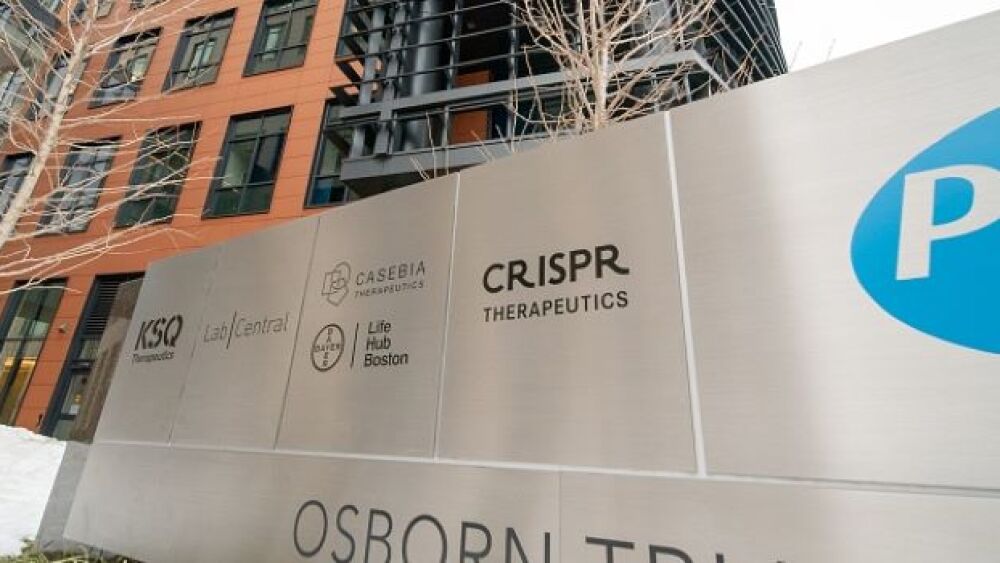CRISPR reported that the overall response rate (ORR) was 71% with 29% of patients experiencing a complete response. The data will be presented at EHA 2022.
Gado/Getty Images
CRISPR Therapeutics will present data at the Annual European Hematology Association (EHA) 2022 Hybrid Congress from the Phase I dose escalation study of its CAR-T therapy in lymphoma. The product, CTX130, is currently being evaluated in two ongoing Phase I trials for relapsed or refractory renal cell carcinoma and various subtypes of lymphoma.
The data to be presented is from the COBALT-LYM study, a Phase I dose escalation trial. It will be presented by Dr. Swaminathan P. Iyer, M.D., professor in the department of lymphoma/myeloma, division of cancer medicine at The University of Texas MD Anderson Cancer Center.
As of December 6, 15 of the 17 patients with T-cell lymphoma were able to be evaluated. CRISPR reported that the overall response rate (ORR) was 71% with 29% of patients experiencing a complete response. The drug achieved what the company called an acceptable safety profile.
CTX130 is a healthy donor-derived gene-edited allogeneic CAR-T therapy targeting cluster of differentiation 70 (CD70), which is expressed on various solid tumors and hematologic malignancies. It is being developed to treat solid tumors, such as renal cell carcinoma and T-cell and B-cell hematologic cancers.
CRISPR is on a roll this year, with a number of expected milestones supported by a large supply of cash. In its first-quarter financials reported earlier this week, the company had $2.221 billion in cash, cash equivalents and marketable securities.
In addition to CTX130, it expects to present updated data with collaboration partner Vertex Pharmaceuticals on their ongoing Phase III trials for CTX001 in transfusion-dependent beta thalassemia (9TDT) and severe sickle cell disease (SCD). They have also initiated two new Phase III studies of the therapy in pediatric patients with TDT and SCD, with hopes of submitting regulatory filings around the world later this year.
At the beginning of February, CRISPR and ViaCyte dosed the first patient in a Phase I study of VCTX210 for type 1 diabetes. The product is an allogeneic, gene-edited, stem cell-derived therapy engineered to create pancreatic cells that won’t be recognized by the patient’s immune system.
The company is also expanding its immuno-oncology programs, enrolling and treating patients in a Phase III trial of CTX110, a CAR-T therapy targeting CD19+ B-cell cancers. Additional data is expected this year. It also has an ongoing Phase I trial for CTX-120, an allogeneic CAR-T therapy targeting B-cell maturation antigen inteded for the treatment of relapsed or refractory multiple myeloma.
At the recent quarterly report, Samarth Kulkarni, Ph.D., chief executive officer of CRISPR, stated, “I am pleased with the ongoing momentum across our broad portfolio of innovative gene therapy candidates and anticipate important company milestones in 2022…. We believe we are well positioned and well capitalized to advance our pipeline and platform to develop transformative medicines for patients suffering from serious diseases.”
In general, CAR-T for solid tumors has been a very difficult nut to crack. The procedure involves collecting T-cells from the cancer patient, engineering them to express CARs specific to the cancer cells and infusing them back into the patient. It has been very successful in hematological cancers. A January 2021 study in Stem Cell Research & Therapy noted that “their efficacy in solid tumor treatment has not yet been supported. The pivotal challenges in the field of solid tumors CAR T cell therapy can be summarized in three major parts: recognition, trafficking, and surviving in the tumor.”
One reason they work well in blood cancers is because CAR-T cells return to the bloodstream and lymphatic system. This means they have more contact with blood cancer cells. But in solid tumors, CAR-T cells have more trouble penetrating tumor tissue. However, as CRISPR’s updates suggest, progress is being made.





